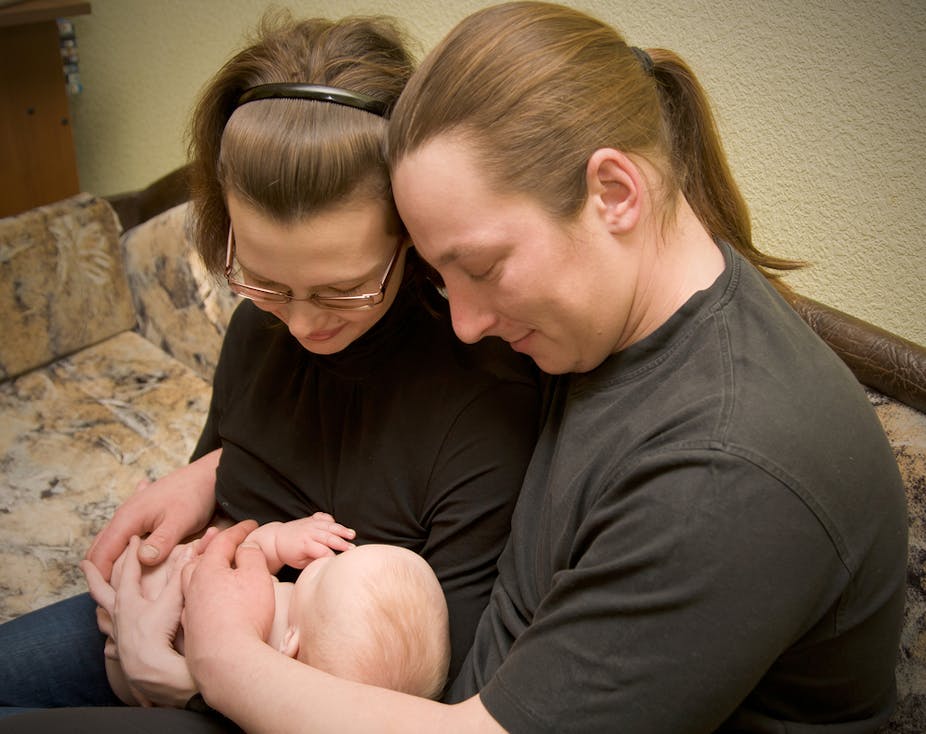Breastfeeding is one of those topics that all parents have a view on. Whether you love it or hate it, the NHS, the World Health Organisation and UNICEF all recommend breastfeeding to give babies the best start in life.
However, practices on the ground in the UK and further afield are very far from ideal. Recent UK data on breastfeeding from the Infant Feeding Survey suggests that the numbers of women who start breastfeeding shortly after birth are high (81%), but this falls to 34% by six months, and only 1% of these babies are exclusively breast fed. But the numbers of women in the UK and in other countries such as Ireland, France, Germany, Japan, and Canada who then go on to continue to breastfeed remain stubbornly low. Rates of exclusive breastfeeding at six-months-old in the UK are so low that national surveys cite them as “negligible” and don’t even report on rates at nine or 12 months.
Clearly there is a very long way to go before breastfeeding rates reach anywhere near the recommended levels. So what can we do to increase breastfeeding rates? Interventions before and after birth that aim to develop knowledge and skills, bust myths and manage expectations could help – but who should they be aimed at? While it might seem sensible for maternity services to focus their attention solely on mothers, the evidence suggests that fathers also have an important role to play.
Working with dads
A number of writers (myself included) have commented previously and sometimes copiously, on how men and fathers (particularly young men and young fathers) are often rendered invisible from mainstream family services including maternity services. In the case of breastfeeding, this has sometimes been more explicit with fathers reporting that they were ignored by health professionals, made to feel like a “controlling partner” if they asked a question about breastfeeding, or were ostensibly seen as just being “in the way”.
Many men simply want to play a part in parenting from the start. And while acknowledging fears about the potential impact on women and children who may have experienced domestic violence, such fears should arguably provide a reason for working with fathers in public services.
In my view, there is a need to challenge the traditional ways maternity services engage with men and fathers. Rather than seeing fathers as a potential risk or an inconvenience that must be tolerated, we should be looking instead to promote the development of positive father-inclusive services. This is important because fathers remain a valuable yet untapped resource for (breastfeeding) mothers, as well as for health professionals and others who may be supporting breastfeeding.
At the moment, many services either do not engage with men and fathers at all, or do so in somewhat haphazard, tokenistic and sometimes patronising ways. These often include “dad’s groups” that use irritating recruitment hooks like the promise of a game of five-a-side football or a greasy fry-up breakfast.

Such bolt-on efforts are appealing to few and excluding of many. Instead, full, meaningful and systematic involvement and engagement with men and fathers by maternity and other services is crucial. This is because (among other things) the growing research evidence demonstrates that fathers can have a significant impact on breastfeeding rates.
A recent Australian study for example, demonstrated that even a minimal intervention that engages fathers around breastfeeding (antenatal education session and postnatal support), can significantly increase any breastfeeding at six weeks compared to controls.
Other studies have shown that amid a range of social, cultural, socio-economic, and psychological factors, the father is one of the most influential persons in terms of a mother’s decision to initiate and continue breastfeeding. This means that fathers can act as either key supporters or key deterrents to breastfeeding.
Indeed our own research and others’, has shown that in some cases, fathers can be instrumental in the decision to move from breastfeeding to formula. Such decisions appear to be underpinned by various anxieties on behalf of the father, such as not being able to determine how much breast milk the baby is getting, concerns over their partner’s distress from easily treatable (albeit painful) cracked nipples and mastitis, worries about not being able to bond with the baby and the exposure of the breasts when breastfeeding in public.
Engaging with fathers
The positive and negative impact that fathers can have on continuing breastfeeding has been known for some time. Yet what is surprising is that there have been few attempts to develop and roll out health promotion programmes that specifically attempt to engage with fathers. Why? One reason is that the importance and influence of a father’s role in the breastfeeding process is often not recognised or valued by many health professionals.
A further reason is that very few studies have actually teased out exactly what is meant by father support in relation to breastfeeding. Understanding what does and does not define father support is necessary to both inform the design of research studies, midwifery and health visiting practice as well as parents themselves.
In our recent study we attempted to do exactly this by creating a model of what father support is, underpinned by both the research literature and data from parents. Our model focuses on knowledge about breastfeeding, attitudes to breastfeeding, involvement in decision-making, practical support and emotional support – providing “entry points” for health professionals and parents (mothers and fathers) which we hope will be useful in the targeted and meaningful support of breastfeeding couples.
Fathers can be half of the problem when it comes to lower than optimal rates of continued breastfeeding. But they can also be half of the solution. To do so, however, there needs to be recognition of the value of fathers’ role in the process, combined with meaningful and systematic positive engagement by maternity services and health professionals.

